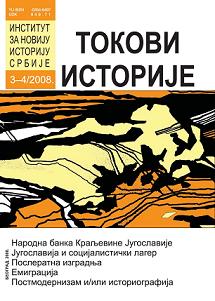ПОБОЉШАЊЕ ЈУГОСЛОВЕНСКО-СОВЈЕТСКИХ ОДНОСА 1961–1962. ГОДИНЕ
The Improvement of the Yugoslav-Soviet Relations 1961–1962
Author(s): Đoko TripkovićSubject(s): History
Published by: Institut za noviju istoriju Srbije
Keywords: Yugoslavia; USSR; Foreign Relations; USA; Cold War; Cuban crisis
Summary/Abstract: The relations between Yugoslavia and USSR started improving on Soviet initiative since 1961. The main reason why the Soviet leadership headed by Nikita Khrushchev started the initiative was the estimate that improvement of relations with Yugoslavia was in the interest of USSR in view of publication of the misunderstandings with China which would inevitably lead to the escalation of the conflict between these two countries. Tito and the Yugoslav leaders accepted that initiative deeming the improvement of political relations with USSR could have positive effect on Yugoslavia. The process of improving relations went on gradually but constantly throughout 1961 and 1962. The willingness of Yugoslavia to broaden and strengthen cooperation in all fields was conditioned by preservation of the basic tenets of its international situation, as well as by the concept of its internal order – i.e. the position of equidistance toward both blocks and non-alignment as the main principle of its foreign-political orientation, and by the system of selfmanagement as the basis of its social and political order. The process of improvement reached its peak during Tito’s visit to USSR in December 1962, when the Soviet side opened the door for overcoming ideological differences and quarrels through Khrushchev’s public recognition of Yugoslavia as a socialist country – which was denied until then. This dimension of the relations was very important since they were relations between countries with one-party communist systems and the domination of the ideological factor. The relations of the two countries during the next few years would develop along the lines set in this period. The disturbance and crisis in the relations set in due to the military intervention of the Warsaw Pact in Czechoslovakia in August 1968. The process of improvement of relations between Yugoslavia and USSR was taking place in a very complex international context. The tensions between the two blocks were reaching culmination exactly then, the conflict of the two super-powers in the Berlin, and particularly Cuban crisis, brought USA and USSR to the verge of war. According to the principle of „connected vessels“, due to the specific international situation of Yugoslavia, the process was also infl uenced by Yugoslav relations to USA. These relations were cooled after Tito’s speech at the first summit of non-aligned countries in Belgrade in September 1961, which was construed by the Americans as support of Soviet views on international questions. However, by carefully observing and analyzing the process of improvement of Yugoslav-Soviet relations the administration of John Kennedy came to the conclusion that the process wasn’t leading to Yugoslavia’s accession to the Soviet block and that the Yugoslav leaders were firmly committed to preservation of the independent position, so that USA should continue its policy of support to Yugoslavia. The relations were improved and stabilized during 1963.
Journal: Tokovi istorije
- Issue Year: 2008
- Issue No: 3-4
- Page Range: 76-97
- Page Count: 22
- Language: Serbian

